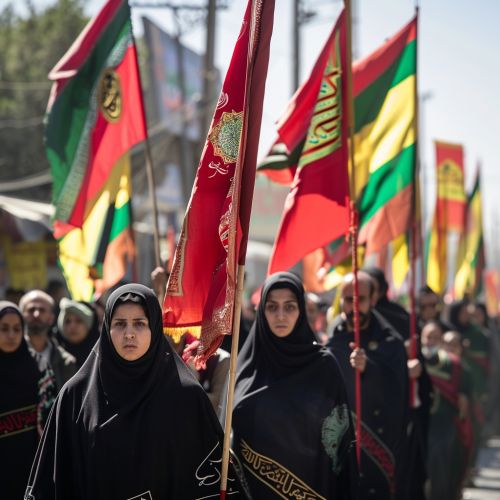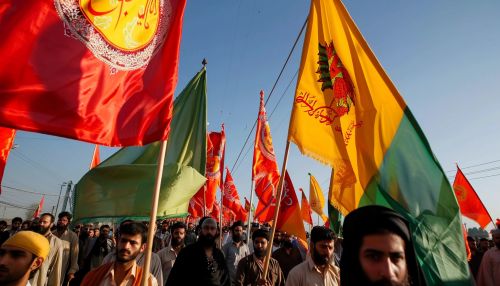Ashura: Difference between revisions
(Created page with "== Ashura == <div class='only_on_desktop image-preview'><div class='image-preview-loader'></div></div><div class='only_on_mobile image-preview'><div class='image-preview-loader'></div></div> Ashura, derived from the Arabic word "Ashara" meaning ten, refers to the tenth day of Muharram, the first month in the Islamic calendar. This day holds significant religious importance for both Sunni and Shia Muslims, although the nature of its observance varies between the two sec...") |
No edit summary |
||
| Line 1: | Line 1: | ||
== Ashura == | == Ashura == | ||
[[Image:Detail-91943.jpg|thumb|center|Devotees participating in Ashura procession, holding flags and banners.|class=only_on_mobile]] | |||
[[Image:Detail-91944.jpg|thumb|center|Devotees participating in Ashura procession, holding flags and banners.|class=only_on_desktop]] | |||
Ashura, derived from the Arabic word "Ashara" meaning ten, refers to the tenth day of Muharram, the first month in the Islamic calendar. This day holds significant religious importance for both Sunni and Shia Muslims, although the nature of its observance varies between the two sects. The day is marked by historical events, religious rituals, and cultural practices that have evolved over centuries. | Ashura, derived from the Arabic word "Ashara" meaning ten, refers to the tenth day of Muharram, the first month in the Islamic calendar. This day holds significant religious importance for both Sunni and Shia Muslims, although the nature of its observance varies between the two sects. The day is marked by historical events, religious rituals, and cultural practices that have evolved over centuries. | ||
Latest revision as of 22:41, 18 June 2024
Ashura


Ashura, derived from the Arabic word "Ashara" meaning ten, refers to the tenth day of Muharram, the first month in the Islamic calendar. This day holds significant religious importance for both Sunni and Shia Muslims, although the nature of its observance varies between the two sects. The day is marked by historical events, religious rituals, and cultural practices that have evolved over centuries.
Historical Background
The historical significance of Ashura is deeply rooted in the events that transpired in 680 CE, during the Battle of Karbala. This battle saw the martyrdom of Husayn ibn Ali, the grandson of the Prophet Muhammad, along with his family and companions. Husayn's stand against the Umayyad caliph Yazid I is seen as a symbol of the struggle against tyranny and injustice. This event is particularly poignant for Shia Muslims, who commemorate the martyrdom with mourning rituals.
For Sunni Muslims, Ashura is also a day of fasting and reflection. It is believed that on this day, Moses and the Israelites were saved from Pharaoh's tyranny by the parting of the Red Sea. The Prophet Muhammad is reported to have fasted on this day and recommended it to his followers.
Religious Observances
Shia Practices
Shia Muslims observe Ashura with intense mourning rituals, which include majlis (gatherings), recitations of lamentations, and reenactments of the Battle of Karbala. These rituals are designed to evoke a deep sense of grief and solidarity with Husayn's suffering. The most dramatic of these practices is the tatbir, where participants engage in self-flagellation to symbolize their mourning and solidarity with Husayn.
Sunni Practices
Sunni Muslims observe Ashura primarily through fasting. The Prophet Muhammad is reported to have said that fasting on the day of Ashura expiates the sins of the previous year. Many Sunni Muslims also engage in additional prayers and acts of charity on this day. The focus is more on reflection and gratitude rather than mourning.
Cultural Significance
The cultural practices associated with Ashura vary widely across different regions. In countries like Iran, Iraq, and Lebanon, Ashura is marked by large public processions, theatrical reenactments known as ta'zieh, and communal meals. In South Asia, particularly in India and Pakistan, the day is observed with processions, poetry recitations, and the distribution of food and water.
Theological Interpretations
The theological interpretations of Ashura differ significantly between Sunni and Shia Islam. For Shia Muslims, the day is a symbol of the eternal struggle against oppression and injustice. Husayn's martyrdom is seen as a divine sacrifice that has cosmic significance. For Sunni Muslims, while the martyrdom of Husayn is acknowledged and respected, the day is more closely associated with the historical events involving Moses and the Israelites.
Modern-Day Observances
In contemporary times, Ashura continues to be a day of significant religious and cultural activity. In countries with large Shia populations, the day is often a public holiday, and extensive preparations are made for the observances. Security concerns have also become a part of modern-day Ashura, particularly in regions where sectarian tensions are high.
